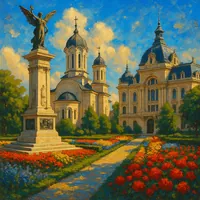Ploieşti, Romania, is distinguished by its deep-rooted connection to the oil industry, having been a pioneer in refining operations since the mid-19th century. Known as the birthplace of Romania's oil industry, the city is home to the world's first oil refinery, established in 1856. Ploieşti's unique historical landscape is dotted with industrial landmarks and museums like the Oil Museum, preserving a legacy that shaped global petroleum production. This rich heritage contributes to its distinct identity.
Notable points about Ploieşti
- Historical Significance in Oil Industry: Ploieşti is often dubbed the "Oil Capital" of Romania due to its rich history in oil production. It was one of the first cities in the world to have a petroleum refinery, which was built in 1857, cementing its status as a pioneer in the global oil industry.
- The Clock Museum: Ploieşti is home to the only dedicated Clock Museum in Romania, also known as the "Nicolae Simache Clock Museum." This unique museum showcases a remarkable collection of approximately 4,000 items, including antique and rare clocks, making it a must-visit for history buffs and horology enthusiasts.
- Vibrant Outdoor Markets: The city is renowned for its bustling outdoor markets like the Central Market, offering an authentic Romanian shopping experience. Visitors will find an array of fresh produce, traditional food items, and hand-crafted goods, which are a delight for culinary adventurers and culture seekers.
- Art and Nightlife for Singles: Ploieşti has a lively nightlife scene and cultural landscape, with theaters such as the "Toma Caragiu" Theatre prominently featuring. The city's numerous bars, pubs, and music venues cater to singles looking for social hotspots and cultural mingling.
- Romantic Options for Couples: Couples visiting Ploieşti can enjoy the city's charming parks such as the Mihai Viteazul Park, known for its serene pathways, intimate gardens, and opportunities for romantic strolls or picnics.
- Accessible Family-Friendly Activities: Families will appreciate the proximity to Prahova Valley, one of Romania's favorite destinations for outdoor adventures. Ploieşti serves as a gateway to the Carpathians, offering easy access to hiking, skiing, and other family-friendly activities.
- Unique Architectural Heritage: The city is distinguished by its eclectic architectural style, blending Romanian, Neo-Classical, and Bauhaus influences. Notable structures include the Orthodox Cathedral of Saint John the Baptist and the Cultural Palace, reflecting Ploieşti's diverse past.
- Robust Sports Scene for Enthusiasts: Ploieşti is passionate about sports, boasting a strong local fanbase for FC Petrolul Ploieşti, a football club with a storied history in Romanian soccer. The city's sports culture is a hub for enthusiasts seeking to watch competitive matches and engage with local fandom.
- Distinctive from Other Romanian Cities: Unlike many other Romanian cities heavily centered on medieval history and Transylvanian lore, Ploieşti's identity is largely tied to its industrial heritage, particularly in the oil sector. This offers a different cultural narrative and experience compared to its counterparts.
- Cultural Events for All Ages: Ploieşti hosts numerous festivals and cultural events throughout the year, such as the "Golden Stag" Festival, offering music performances, arts, and local traditions. This vibrant cultural calendar attracts visitors of all ages and interests, providing a lively and engaging environment.


